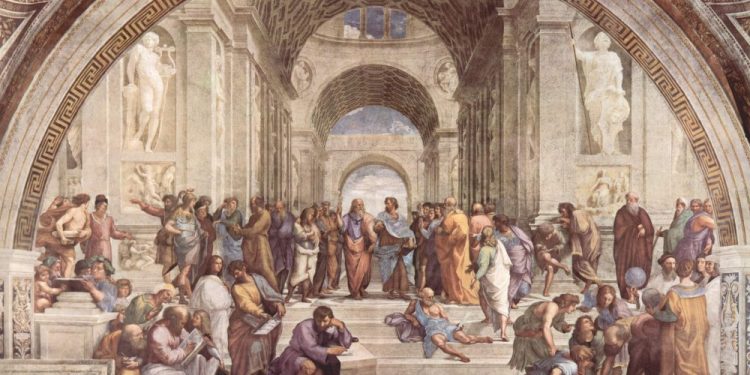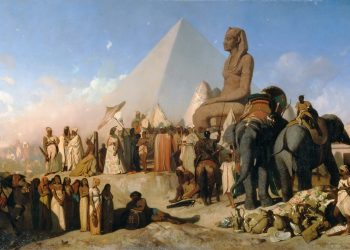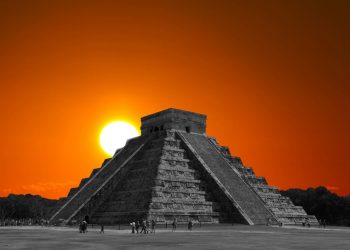Ancient Greece has been fundamental for creating the culture of the Western world and the development of modern civilization. This is not only true from a military, a financial, or a social perspective. However, it is also important to consider the most important Greeks that provided the world with great information, significant legislation, mighty empires, and enriched development.
10 Of the Most Influential People in Ancient Greece
There have been multiple articles regarding the Greeks being great military leaders, brave and robust troops, and having a powerful mentality that helped them get into the pantheon of ancient history. Nonetheless, not many articles combine the work of the Greek military leaders, the best ancient historians, the best legislators, and the philosophical history of Greece. The military efforts are not the only thing most ancient Greeks are honored for, which is why it’s important to understand the essential Greeks from the philosophical and social perspectives.
In other and simpler words, this article presents the ten most influential people in Ancient Greece Another critical point that must be addressed before the analysis is that this is an analytical piece but it also considers the writer’s perspective. Although the reader is more than welcome to disagree, throughout the article, I believe that I make a good case for why these particular figures I chose deserve to be on the list.
Alexander the Great (356 BC — 323 BC)
Alexander III of Macedon was the son of Philip II, and he became known as the king of the ancient Greek Kingdom of Macedon. He was one of the most influential people in ancient Greece.
After Philip II was assassinated for mysterious reasons, Alexander continued the legacy by conquering the southern cities of Greece: Sparta, Athens, and Thebes. Alexander was planning a Panhellenic campaign against the Persians, and his goals were also to free the Greeks of Asia.
However, after the battle in the Granicus River (334 BC), which was the point of access to the Asian territories, Alexander had discovered a way of conquering the whole Persian empire. The campaign is not the only reason why Alexander is such an influential figure in Greek history. However, the Hellenistic empire’s culture was cultivated and developed in the years that came after that.
The way of achieving financial wealth and the culture of worshiping a divine power that he advocated, mainly in Asian territories such as Babylonia and Syria, was a starting point for these Asian cultures. However, in addition to this argument, one has to show that the Greek culture was internationalized at this point.
The military approach and many other ways of organizing the communities he conquered would be a model for the rest of the ancient empires after him. He was undeniably one of the most important people from Ancient Greece and arguably the best military leader in the country’s history. He showed how unity and faith could result in multiple victories on the battlefield. The Greeks were never a country with enormous resources or millions of troops. However, the Hellenistic mentality of fighting and pushing through every challenge with a team spirit and unity was what Alexander created and adopted by the rest of the Greeks.
Leonidas I (540 BC — 480 BC)
Leonidas is the only leader on the list that is justifiably honored even without having a history of establishing a dominant world empire. He deserves to be on the list more for a legendary and unique contribution to the cultural and legacy aspects of the Spartan world.
Evidence has shown that one of the most ruthless poleis in human history was the Spartans, which was developed during Leonidas as the Spartan King. Spartans were not afraid of anyone, and regardless of the enormous number of military troops that they were called to fight, they were willing to die on the battlefield so that they could protect their city.
This spirit of collectivity, courage, and self-sacrifice came from Leonidas and, more specifically, from the Battle of Thermopylae. This was a fight during the Greek-Persian wars, where Leonidas had an army of 4,000 Greeks, and Xerxes had a Persian army of 80,000 troops. The disgrace that the Spartans would feel if they returned to Sparta defeated was against their values, and even though the rest of the Greeks left, 300 Spartans, with Leonidas as the leader, stayed in the region to sacrifice themselves.
The quote of Spartans, “either coming with their shield or coming back on it” is best described by the figure of Leonidas. The battle with the Persians showed the successors that these were the values a Spartan should cultivate. This is another influential leader who developed and grew the philosophical aspect until this day. The mental toughness of the Greek world is applied not only in the ancient but also in the contemporary context.
Pericles (495 BC — 429 BC)
Pericles was the leader and the creator of the Athenian Golden Age, when the city flourished financially, socially, democratically, and militarily. He was also one of the most influential people in ancient Greece. According to Thucydides, Pericles was the first citizen of democratic Athens because he was the one that transformed the whole community into the regime that dominated the world until the modern era.
Pericles is the prominent leader of the Athenian city, but it is also a historical figure that deserves to be honored as the best Greek leader, not only Athenian. He transformed all the Athenian alliances into a Greek empire that would later win crucial battles and build the structure for the Western democratic civilization.
The only unfortunate event is that Pericles was the prominent leader who had worked more towards building such a democratic empire. However, the Athenians were at war with the Spartans when he died. He did not see his work finished or completed. That is why Pericles did not leave back a great empire that could take over the ancient world, but even as an Athenian general, he provided the roots of democracy and unity.
Socrates (470—399 BC)
Among the greatest philosophers of all time, Socrates is a name that has been credited as one of the founders of the theory of Western philosophy. His virtues and perspectives will probably remain in the books for centuries and even millennia. Most of the written accounts that we have for Socrates come from either Plato and Xenophon, both his students.
Socrates lives between 470 and 399 BC, in the ancient Greek polis of Athens. It was a period of decline for the Athenians since they were defeated at the end of the Peloponnesian war (431-404 BC). Athens had been defeated, Sparta was the winner, and in the aftermath, the latter had imposed an oligarchic regime of 30 tyrants in the former. Even though the oligarchy was overthrown and Athenian democracy was restored, the unstable conditions prevailed.
Socrates’ approach to questioning and evaluating philosophical knowledge and the aspect of general morality in many sectors was considered undemocratic. He advocated a stance of not caring about what other people stated, not believing what the law was based on, and, more generally, not following public opinion. His career was based on doubt, and in the Athenian context, this was more of a way to say that democracy could not distinguish right to wrong. Even though the unfortunate events of the philosophical views led to his death in the Athenian empire, his principles and approach to the state are still important.
Plato (424/423—348/347 BC)
Plato is another crucial figure in the foundation of Western philosophy and the build-up of today’s Western civilized worldview paradigms and principles. Plato and Socrates are interested in the best kind of person and the best kind of city.
One of the critical features of Plato’s analysis is not only about the analogy, but the kind of city and regime that will bring out the best of us, that will encourage us to be better people. Plato argues that a just society is one in which people with sound reasoning will rule over the military.
Aristotle (384–322 BC)
Plato’s student Aristotle was critical of the argument in Plato’s Republic and his city-soul analogy by missing the importance of the different people and their feelings.
Aristotle wrote many things against Plato but shared many considerations for the best regime with him. Aristotle wanted to distinguish by characteristics of the effect on the people and the citizens.
According to how they were regulated lawfully or unlawfully, the ruling class did what they had to do or did not. There were six regime types. A lawful monarchy, aristocracy, and polity are the three lawless types of tyranny, oligarchy, and democracy.
Then the conclusion follows: the third form of government is a polity, mixed government. It is the least good of the suitable forms, making democracy the least bad of the imperfect forms. To be ruled by the many poor is not as good as to be ruled by one wise man or a middle class. However, being ruled by the many is better for a tyrant or oligarchs.
This becomes the ranking for Western philosophical politics, and we see monarchs or aristocrats proclaiming themselves the best based on Aristotle’s account.
Herodotus (484-425 BC)
Herodotus lived at the time of the Golden Age in Athens, and he was alive when Athens and Sparta were about to fight in the Peloponnesian war. At his time, the word Historia does not mean history but means inquiry. That is why he includes recordings, and this act aims at not forgetting the people’s feats and achievements. Herodotus privileges both Greeks and not Greeks, and another aim of his investigation is the Second Persian war (479 BC).
Herodotus is one of the first primary sources of Greek history and the first historian to understand and analyze the Greek—Persian war. Herodotus wrote upon different interpretations of the world, such as the Thales of Miletus, who claims that ‘all is water’ and other historical views.
However, he was not the only one the sophists were also the primary teachers, which were very extreme in their views and denied morality in their decisions, responsible for the education of Athenian students. There was no truth but persuasion. The excellent speaker was not the one with a firm policy but the one who would make the weak argument stronger.
Thucydides (460—400 BC)
The historian who presented the Peloponnesian War is Thucydides. The war ended in 404 BC, but his narrative of the war ended in 411, and researchers think that his life ended before the end of the war. He was an Athenian general in the Peloponnesian War to fight against the Spartans, but he failed to succeed in Amphipolis, and that is why he was sent to exile in 424. In the remaining years, he lived in both Sparta and Athens, and this habit gave him a well-rounded account of the two sides. He is critical of Herodotus, mainly due to the latter’s use in mythological stories and not objective narrative.
Thucydides states that this was the greatest war in ancient history. He also had the idea that this was a single war. However, historians criticized him because it was not a 15-year period of constant warfare but a proxy conflict. Thucydides is not considering the proxy battles as part of the war. He wants to treat it as one greater war and offers different and well-rounded interpretations about the events, the cause, and the outcome of the Peloponnesian War.
He states that the cause was breaking the 30-year truce between the Spartans and the Athenians. Nevertheless, he also thinks that the different characteristics of the two sides, from oligarchy to democracy, and everything of this nature, led to the war. This is why the enriched and diverse account of Thucydides ranks him among the top historians and philosophers on the list. He is also responsible for the richness in the resources that have been found as far as it concerns one of the first destructive and vital civil wars of the Mediterranean.
Cleopatra (69 BC — 30 BC)
After Alexander the Great’s death, the empire he had created during his reign was divided into four Hellenistic states: the Seleucid Empire, the Kingdom of Pergamon, Macedon, and the Ptolemaic Kingdom of Egypt. The transformation of the roman republic to a Roman Empire determined the dominant power of the Mediterranean, with most of the kingdoms having to accept the outcome. One kingdom with such a valuable history and developed faith that did not permit it to be surrendered to the Romans was the Ptolemaic kingdom. The most historical and influential leader was Cleopatra, who paradoxically was of Greek origin.
In a world of male dominance, a woman had taken over and commanded the government with the military. Still, her independent spirit was not the only thing that was of value for the next generation of Hellenistic and Greek women. She managed to change the ruler’s view and the simple people in Greek since she adopted a more empathetic relationship with the subjects, which led them to take into account her strong influence. Her death ended the age of Hellenistic empires and asserted the beginning of Roman superiority in the Mediterranean.
One of the Most Influential people of Ancient Greece: Plutarch (45 — 120 AD)
“Darius would be willing to start an attack immediately after the end of the conflict in Marathon, but this time Athenians would be ready since a runner made 42 kilometers to protect the city”. This is one of the essential details in the history of the Greek-Persian Wars. Nonetheless, this is not a story of Herodotus, but this is found in the works of Plutarch. Plutarch was another crucial Greek historian who lived in the late 1st to early 2nd century AD. Although he writes nearly 600 years after the battle of Marathon, he has a lot to say in terms of the significance of the events for the following centuries, along with the evolution of Greek society and history after the war.
He lived during the Roman Empire, and his biographies are very different from Herodotus’. There is a big difference between this source’s value and Herodotus’s source. The importance of this figure in the world of history, philosophy, and social evolution in the Greek world is one of a kind since Plutarch provides us with more specific details that not only were not evident but can also be mind-blowing if people understand them in the modern era.
For example, in the Golden Age of Pericles, the rebuilding of Athens had a total cost of 5 thousand silver talents, and one ship would cost two silver talents. According to Plutarch, Pericles was criticized for using other Greek cities’ money for Athens. However, Pericles responded that the money belonged to the one who took it since he protected these cities and provided them with security. These are all details that, without the contribution of Plutarch, would not be well known to the modern world.
Join the discussion and participate in awesome giveaways in our mobile Telegram group. Join Curiosmos on Telegram Today. t.me/Curiosmos
References
Griffin, Jasper; Boardman, John; Murray, Oswyn (2001). The Oxford History of Greece and the Hellenistic world. Oxford: Oxford University Press. p. 140,
Clark, Stephen. 2012. Ancient Mediterranean Philosophy: An Introduction. New York: Bloomsbury,
Curd, Patricia, and D.W. Graham, eds. 2008. The Oxford Handbook of Presocratic Philosophy. New York: Oxford Univ. Press,
Gaca, Kathy L. 2003. The Making of Fornication: Eros, Ethics, and Political Reform in Greek Philosophy and Early Christianity. Berkeley: University of California Press,
Garani, Myrto and David Konstan eds. 2014. The Philosophizing Muse: The Influence of Greek Philosophy on Roman Poetry. Pierides, 3. Newcastle upon Tyne: Cambridge Scholars Publishing,
Kemerling, Garth. “Plato: The Republic 5–10”. philosophypages.com.











